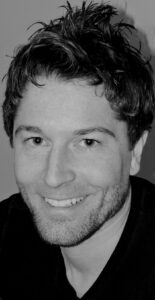
Andrew Archer got interested psychology and social work after being diagnosed with bipolar disorder himself. He wrote a memoir, Pleading Insanity, to come to terms with the cultural, biological, and environmental forces affecting mental health.
“I’ve committed my life to learning to better understand these mysteries as a means to build awareness and to assist those who are suffering,” says Archer, now a psychotherapist at the Midwest Center for Human Services.

Archer will bring a unique perspective to two upcoming courses for the University of Wisconsin-Madison: Manic Depression in America (Sept. 14) and Anatomy of Trauma: Past, Present, and Future Approaches to Healing (Oct. 19), both at the UW Pyle Center. He’ll share his insights with fellow mental health professionals as both a clinician and a client.
“I’m offering a dynamic approach to teaching that includes academic, clinical, and lived experience with mental health,” Archer says. “I have instructed college courses on psychopathology, treated individuals via psychotherapy, and also endured the consequences of psychiatric drug treatments.”
‘Focusing just on the brain has limitations’
In Manic Depression in America, Archer will draw on his personal experience with mood disorder while critiquing the narrow focus on neuroscience and psychotropic medications in treatment.
“Participants will learn that mania and depression are both culturally constructed as well as physiological processes, meaning that focusing just on the brain has limitations,” he says. “We have to be aware of the changes in contemporary life such as economic instability and income inequality as possible causes.”
In Anatomy of Trauma: Past, Present, and Future Approaches to Healing, Archer will advocate a holistic and eclectic approach to helping clients. He’ll show how trauma disrupts bodily processes, provide an overview of multiple interventions, and explore the role of mindfulness in treatment. A guest speaker, psychotherapist Devin Coogan, will offer experiential exercises to highlight the intersection of trauma and habitual patterns.
“I think the current trial for mental health professionals is realizing that what we call mood disorders or affective dysregulation stem from myriad sources,” Archer says. “This includes attachment issues in early childhood development, traumatic life events, drug use and, most importantly, the stress of current relationships and life changes.”
Along with speaking, Archer is excited to engage with participants at his two workshops.
“The interactive aspects of professional workshops are really fun, and there probably aren’t many more beautiful settings than the Pyle Center in autumn,” he says. “I’m looking forward to meeting new people and hearing their perspectives on mental health treatment.”
For more information, contact Kristi Obmascher, kristi.obmascher@wisc.edu, 608-262-8971.